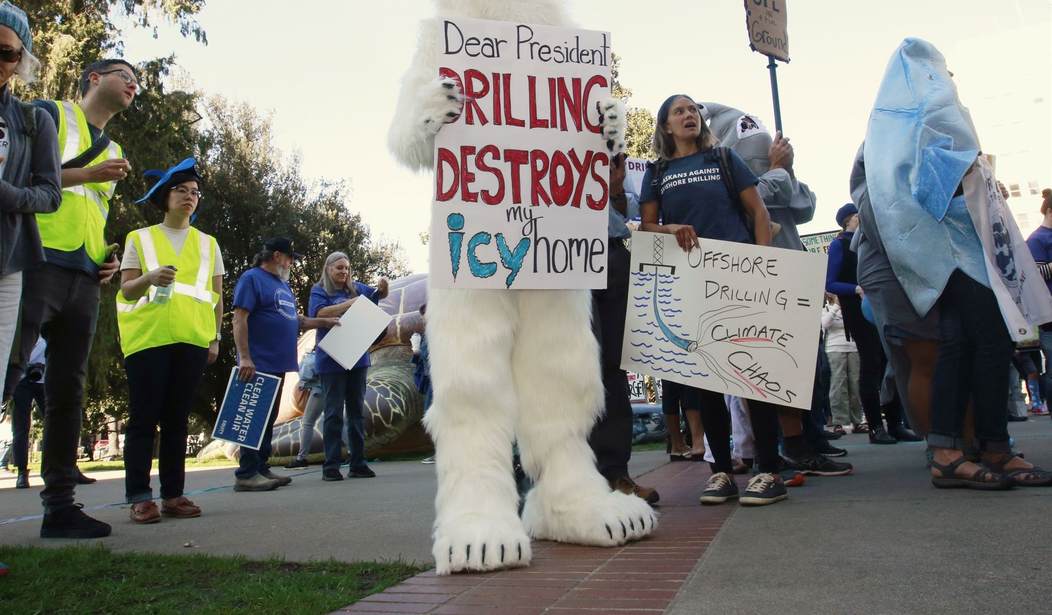Recently, a tweet circulated of progressive climate activists being arrested for their roles in a protest staged at the White House. Chanting “no climate, no deal” in relation to ongoing infrastructure negotiations, and egged on by progressive legislators such as Reps. Cori Bush and Alexandria Ocasio-Cortez, activists in D.C. and other major U.S. cities promised to “shut sh*t down,” all for the welfare of our planet. Or something like that.
This isn’t anything new. On Earth Day, some of those same activists dumped cow manure – otherwise known as littering because city workers then had to clean it up – in front of the White House to protest President Biden’s climate plan. There are countless other examples of performative protests from these activists in recent years, but very few examples of them actually pushing policy through the legislative process. Not only are these tactics often cringeworthy, they’re also ineffective.
What is most shocking about Sunrise’s protest of Biden’s infrastructure plan is that it, in fact, does contain the very climate measures they claim it doesn’t - $47.5 billion for climate resiliency projects, $15 billion for EV charging stations and electric buses, $73 billion for upgrading the electricity grid, and $16 billion for capping orphaned wells and cleaning up abandoned mines.
Progressive climate activists beg for action, but when they’re presented with the opportunity, they turn up their noses.
Another recent example is the recent passage of the Growing Climate Solutions Act (GCSA) in the Senate, a bill that would lower barriers to entry for farmers and landowners to enter carbon markets and help fight climate change by naturally sequestering emissions. Will this legislation single-handedly solve climate change? Of course not, but it empowers rural Americans and agricultural interests to engage in a meaningful way and will result in sequestered carbon emissions.
Recommended
Yet, a sweeping coalition of progressive climate groups, including 350.org, Zero Hour, and more, sent a letter to congressional leadership urging them to oppose the bill. Frustratingly enough, the bill was ultimately opposed by eight senators: three Republicans and five of the most progressive, supposedly climate-minded legislators in the chamber including Sens. Bernie Sanders and Elizabeth Warren.
That’s right. Sanders and Warren agreed with Jim Inhofe and Josh Hawley that bipartisan action to address climate change was not worthy of passage.
It’s no wonder that there’s a growing feeling of cynicism among young conservatives who want to see climate change actionably addressed. These activists aren’t gluing themselves to doors or getting arrested as a light-hearted afternoon activity, a glaring demonstration of privilege when getting arrested can ruin lives of others. Instead, they’re advocating for legislation such as GCSA in good faith. In other words, they’re not making perfect the enemy of good. Climate action is too important to throw away opportunities for real progress.
To be fair, the work of progressive activists absolutely did make climate change a more mainstream issue, and their work on that front should be lauded. Even so, the time for kicking and screaming has to be over. There’s a better path forward for the environmental movement. Not one focused on headline-making activism, but one focused on real, effective action. With congressional Republicans more engaged than ever in recent memory on environmental issues, there should be endless opportunities for bipartisan legislation that reduces emissions and helps the U.S. adapt to the effects of climate change.
To put it simply, our planet both needs and deserves more than performative activism. Progressive environmental activists certainly get one thing right: climate change is an urgent issue that warrants a significant, timely response. Organizing a symbolic littering campaign or blocking every entrance to the White House, though, will not accomplish this. It’s time for activists regardless of partisanship to come together in favor of action, not simply activism.
Stephen Perkins is the Vice President of Grassroots Strategy at the American Conservation Coalition (ACC).

























Join the conversation as a VIP Member